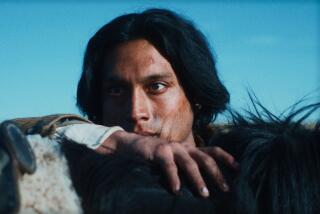‘Forgotten People’ Shows Island of Cruelty
- Share via
Watching Dai Sil Kim-Gibson’s painful film “A Forgotten People: The Sakhalin Koreans,” you wish you could turn back history’s clock.
You wish that Japan and Russia had never gone to war with each other (twice). You wish that Japan had never invaded and colonized the Korean peninsula. You wish that Japan had never forced Koreans to work as a cheap labor force on resource-rich Sakhalin Island before and during World War II. And you wish that the victorious Soviet Union, claiming Sakhalin after the war, had allowed the enslaved Koreans to return home.
But the 20th century seemed to have some terrible plans in store for the unlucky Koreans, who continually found themselves either forgotten by powerful nations or endlessly abused by their frequently ruthless neighbors.
Kim-Gibson does not hide her sentiments: As a Korean-born woman, she endured World War II and the Japanese terror and eventually emigrated to the U.S.
With the end of the Cold War and Soviet totalitarian rule, the Sakhalin Koreans could finally talk about their awful history, and Kim-Gibson went to the island (shaped like roughly like an arrow just north of the northernmost Japanese island of Hokkaido) in 1993. The Koreans there told her their stories.
*
The hourlong film is fortunately short on Kim-Gibson’s own distractingly flat narration and full of the accounts of witnesses to Japanese and Soviet atrocities. Retired miner Im Pan Khe describes the brutal labor marches in which Korean slaves mined precious coal for the Japanese war machine. The workers were cynically lured to the island with promises of high wages, but paychecks never came. They lived on a diet of seaweed and barely edible rice, and as many as half of the 40,000 Koreans died before the Soviet takeover.
Most shocking of all are several accounts here of Japanese plans for genocide of the island’s Korean population before the Soviets arrived. Instead, as Khe says, “the Japanese worked us like horses and oxen. Then they went away, leaving us like worn-out shoes. . . . So the Russians just grabbed us.”
Imprisoned by events out of their control, the Sakhalin Koreans were often forced to give up their names and language, depending on what nation was holding them by force. Kim-Gibson’s film may be a testimony by those who survived, but it’s also a bracing reminder of the human victims in the global chess game played by superpowers.
* “A Forgotten People: The Sakhalin Koreans” airs at 10 tonight on KCET-TV Channel 28.
More to Read
Only good movies
Get the Indie Focus newsletter, Mark Olsen's weekly guide to the world of cinema.
You may occasionally receive promotional content from the Los Angeles Times.










